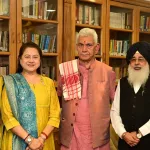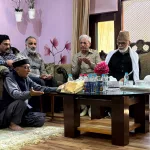Though Binti-Hawa is taking big strides in different fields of life but she is yet to break the shackles of patriarchal hegemony completely. Education has considerably helped in the mitigation of her plight but the major chunk of female populace is still not making it at par with their male counterparts. The scenario is even bleaker in our rural areas where most of the women have been denied and deprived of their basic right to education. They work as housewives and homemakers which undoubtedly add to the beauty of a woman but these sedulous women are treated like unpaid maids and servants. Their lives are no better than the lives of drudges and bonded-labourers.
Though young girls from our rural areas have access to educational institutions but they continue to confront the prejudicial approach of our macho society. The dropout rate of girls at secondary and higher secondary levels is still very high. They are not encouraged to pursue higher education, albeit a few, and miserably fail to realise their dreams. They are forced to leave their education early, and are either persuaded to help their parents in different day to day activities or made to face the gallows of early marriage. Female foeticide has almost been eliminated but the birth of a daughter still raises many eyebrows and causes frowns on the faces of her own parents and other family members. She is deprived of her share in ancestral property. Thus, she continues to suffer on multiple fronts, facing the stern male monopoly.
Women living in big and metropolitan cities have found place in corporate, commercial and government offices while as the women of smaller towns and villages continue to work as housewives. Ironically, the strenuous work done by these industrious women is never appreciated and recognized as work. Being a housewife is the most ungrateful and thankless job in contemporary times because no one counts her arduous chores as work though she toils interminably from dawn to dusk. Our benchmarks and standards to measure the performance of people around us, is either gender centered or money oriented. I pity and curse such biased mindsets and outlooks. Housewives and homemakers must get due recognition and appreciation for their dedication to work selflessly. Imagine a day, if our housewives viz mothers, sisters, daughters-in-law, and aunts would cease to work. Our homes will bear an empty and disastrous look.
A housewife is the first in a family to break her sleep prior to dawn. After attending religious rituals, she straight away moves towards the kitchen of her house. Traditionally, Kashmiri women prepare dough to make rice or maize rotis which are baked on blazing embers. Though LPG stoves and other electrical cooking gadgets have reduced the amount of smoke she inhales every day, but the scenario in our villages is yet to witness a remarkable change. Her proximity to traditional chulha has been taking toll of her health terribly. Honourable men hardly give any heed to it. She continues to suffocate for centuries together. Preparing meals for the entire family, taking care of children and elderly people of her home, has become her gender specific obligation and duty. I don’t know if any man dares to change the wet diaper of his own child once in a month.
Besides carrying out different domestic chores like cooking, cleaning, sweeping, washing, extending different services to her family members at different times, attending sick, milking a cow, fetching a pail of water – I mean, the women work like robots. A housewife is the last member of a family to go to bed. Besides these difficult duties, she never desists from accomplishing agricultural errands. I have seen women of our rural belts preparing land for sowing, planting, weeding and harvesting. But, still she is not called a working woman. Oblivious men often taunt her as lazy and shirker. Height of selfishness and egotism… isn’t it!
A housewife hardly gets a break from her daily routines. If everyone in a family is enjoying naps in comfortable rooms on a scorching summer afternoon, the housewife must be working in the kitchen. When everyone loves to sit under thick blanket layers with kangri under legs, and hot beverages like tea or Kehwa around, the poor housewife is seen either preparing some snacks for her children or washing dishes with ice cold water. They hardly get time to take care of their personal necessities and requirements. But still, she is excluded from the list of working people. Isn’t it injustice and gender discrimination? Stepmother treatment meted out to the women in Kashmir, coupled with other factors, has worsened their mental health issues. According to MSF (Medicine Sans Frontier) – More than fifty percent of women in Kashmir valley (compared to thirty seven of percent men) are suffering from probable depression. Thirty six percent of women (compared to twenty one percent of men) are likely to have anxiety disorders.
Housewives are never included in decision making. They have been confined to the production and rearing of children. They are no more than maids and servants in our homes. They work tirelessly, but to the utter shock and surprise, they are never called working ladies. Most of them are harassed in one or the other pretext. From the verbal abuse and taunts of her in-laws and husband, they are at times subjected to physical torture and even sent to death. And mostly, housewives fall victim to varied types of violence.
We owe a great debt to our mothers, sisters, wives and other women for being altruistically generous and compassionate to us. We would have not been what we are today if our homemakers would not have lent the tremendous service to us. The sacrifices and services rendered by these hard-working women deserve to be acknowledged, appreciated and recognized. Hats off to all the housewives for being simple, sober and sedate. They add colour to our monotonous lives.
(Author is a Teacher and Rising Kashmir Columnist. He can be reached at [email protected]




